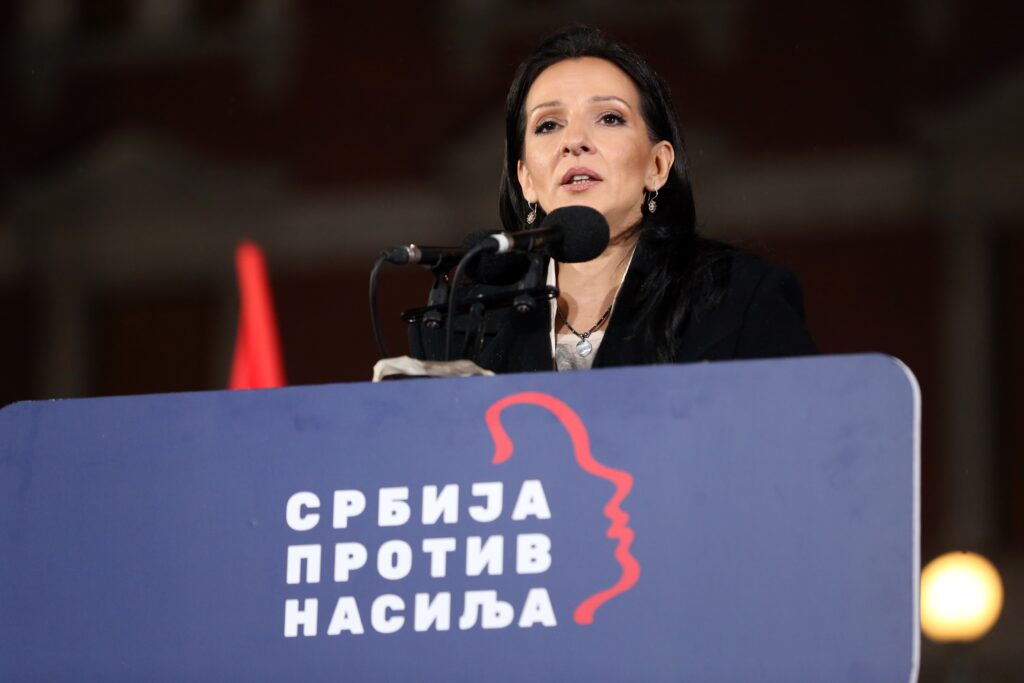Serbian opposition protest election fraud
Press play to listen to this article
Voiced by artificial intelligence.
BELGRADE ― Opponents of Serbia’s illiberal President Aleksandar Vučić, who claimed a win in Sunday’s elections amid allegations of major irregularities and voter fraud, have declared a hunger strike and have set up camp inside the central election commission building.
Since the vote, opposition parties and independent election observers have claimed that electoral fraud occurred despite claims by Vučić, the former head of the ruling Serbian Progressive Party (SNS), to have won the snap ballots, especially in Belgrade, the country’s capital.
“We cannot and must not recognize the stolen Belgrade elections,” Marinika Tepić from the opposition Serbia Against Violence party announced Monday night before joining the protest inside the building. Several thousand Serbs rallied in the center of the city and blocked one of its main thoroughfares
The ruling SNS clinched about 47 percent support on the national stage, giving the party a commanding majority in parliament that ensures they can extend their decade-long reign. Yet in the pivotal battleground of Belgrade, where an opposition win seemed imminent, the margin tightened significantly, with the SNS securing about 39 percent while Serbia Against Violence edged over 34 percent of the vote.
You may like
The central election commission is still processing the final results of Sunday’s elections, as well as the complaints.
Vučić balances a relationship with both the West and the Kremlin, but now will have to navigate new concerns he is undermining the country’s democracy.
Traditionally, EU and Western leaders would have extended their congratulations to Vučić’s ruling SNS after elections. This time, only figures like Hungarian Prime Minister Viktor Orbán, Russian President Vladimir Putin’s spokesman Dmitry Peskov, and the Chinese Foreign Ministry have offered kudos.
While accusations of irregularities have plagued past elections in Serbia, the December 17 national and local elections were deemed more irregular than usual. Local independent election monitor CRTA declared that “the Belgrade election results fail to mirror the genuine will of the residents who cast their votes.”
In the past, election observers including the OSCE and EU representatives largely rubber-stamped the voting process, brushing aside minor irregularities.
These elections, however, mark a stark departure as monitors express grave concerns. In their report the OSCE declared the ballot was held under “unjust conditions,” citing a landscape marred by harsh rhetoric, media bias, pressure on public sector employees, and misuse of public resources.
The report also flagged instances of violence, vote-buying, the stuffing of ballot boxes, and frequent allegations of “organizing and busing voters to support the ruling party in local elections.”
“We have come to present the evidence we have so far, we have more, we have hundreds and hundreds of objections,” Tepić said.

Protesters gathered in front of the central election commission on Monday and Tuesday, blowing whistles and vowing to persist until the elections are overturned.
“I’m protesting because the elections were absolutely rigged and the current results do not reflect the will of the people,” said Ana Mandinić, a 28-year-old political scientist who joined the protests in central Belgrade. “We will all take to the streets because we want normal elections at least once in our lives.”
This article has been archived for your research. The original version from POLITICO Europe can be found here.

